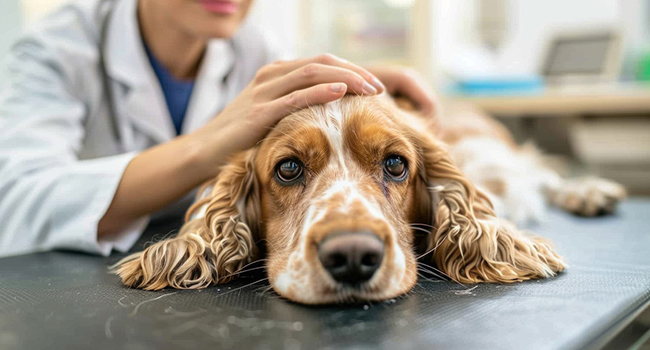

As pet owners, it’s essential to understand that our furry friends can’t communicate with words when they’re feeling unwell. Recognising the early signs of illness in your pet can make all the difference in ensuring prompt treatment and preventing more serious health issues. While some signs of illness may be obvious, many symptoms can be subtle and easy to overlook. Learning to detect these early indicators will help you stay ahead of potential health problems and keep your pet happy and healthy.
One of the earliest signs that your pet may be unwell is a noticeable change in behaviour. Pets, whether cats, dogs, or other animals, often show distress through altered habits or temperaments. A typically playful dog becoming lethargic or a normally independent cat becoming overly clingy could indicate something is wrong.
Lethargy or Fatigue: If your pet seems tired or uninterested in activities they usually enjoy, such as playing or going for walks, it could suggest they’re not feeling well.
Irritability or Aggression: If your pet becomes unusually aggressive or irritable, especially when you touch certain areas of their body, it might be a response to pain or discomfort.
Withdrawal: Pets that are normally social may begin to hide or withdraw from their surroundings if they’re feeling sick.
While changes in behaviour can sometimes be due to environmental factors, they are often early indicators of an underlying health issue. If these changes persist, it’s best to consult with your veterinarian.
Another critical sign of illness in pets is a change in their eating or drinking habits. Like humans, pets can lose their appetite when they’re unwell, and this is particularly worrying if it lasts more than a day or two.
Loss of Appetite: A sudden disinterest in food, especially if your pet is usually an enthusiastic eater, could signal illness. Persistent refusal to eat requires immediate veterinary attention.
Increased Thirst: Excessive drinking can indicate issues such as diabetes, kidney disease, or an infection. Keep an eye on your pet’s water intake and note any significant changes.
Vomiting or Diarrhoea: Occasional vomiting or diarrhoea isn’t always cause for alarm, but frequent episodes are concerning. These symptoms can indicate gastrointestinal issues, infections, or even poisoning.
Pay attention to your pet’s overall nutrition and hydration. Any notable changes in appetite or digestion should be promptly addressed.
Beyond behavioural and dietary changes, there are several physical signs that might indicate your pet is unwell. Regularly checking your pet’s body for abnormalities or discomfort can help you catch problems early.
Weight Loss or Gain: Unexplained changes in your pet’s weight can indicate underlying health issues such as thyroid problems, diabetes, or organ disease.
Changes in Coat and Skin: A dull, thinning, or greasy coat can be a sign of poor health. Additionally, excessive shedding, hair loss, or skin lesions might point to allergies, parasites, or other conditions.
Bad Breath: Foul-smelling breath isn’t just unpleasant; it could be a sign of dental disease, oral infections, or gastrointestinal problems.
Laboured Breathing: If your pet is breathing rapidly, wheezing, or struggling to breathe, this is a clear sign that they may need urgent medical attention.
Observing your pet’s physical condition regularly can help detect these signs early and improve their overall well-being.
Frequent Urination or Difficulty Urinating: Pets that suddenly begin urinating more frequently, or seem to struggle during the process, may have a urinary tract infection, kidney problems, or other underlying conditions.
Constipation or Diarrhoea: As with changes in appetite, irregular bowel movements should not be ignored. Chronic constipation or diarrhoea is often linked to digestive issues or dietary problems.
Incontinence: If your pet starts having accidents in the house or seems unable to control their bladder, it could indicate a bladder infection or even neurological problems.
Pay attention to these elimination changes, as they are often among the first signs of internal issues that require medical intervention.
If your pet is moving differently or adopting unusual postures, it might be a sign of pain or discomfort. Limping, stiffness, or difficulty standing or lying down can all point to musculoskeletal problems, arthritis, or even injuries you may not be aware of.
Limping or Favouring a Limb: This can be caused by injury, arthritis, or even something as minor as a thorn stuck in their paw. However, if it persists, it's worth getting checked out.
Hunched Back or Tucked Tail: Pets in pain often hunch their backs or keep their tails tucked between their legs, particularly if the pain is in their abdomen or back.
Shaking or Trembling: While occasional shaking can be due to cold or fear, persistent trembling may indicate pain, infection, or even neurological conditions.
Watching how your pet moves is a simple but effective way to monitor their health, especially if you notice recurring signs of discomfort.
Spotting the early signs of illness in your pet is crucial for their health and longevity. By being attentive to behavioural changes, physical symptoms, and eating or elimination habits, you can catch potential health problems before they become serious. Regular check-ups with a vet, such as those offered at Eden Pet Care, can also help you stay ahead of any issues and ensure your pet gets the best care possible.
If you notice any of these signs in your pet, don’t hesitate to seek professional help. At Eden Pet Care, our experienced team is here to support you in keeping your furry friend happy and healthy. Contact us today to schedule a wellness check and ensure your pet stays in top condition!
Moreover, keep a list of emergency contact numbers, including your regular vet and the nearest 24-hour